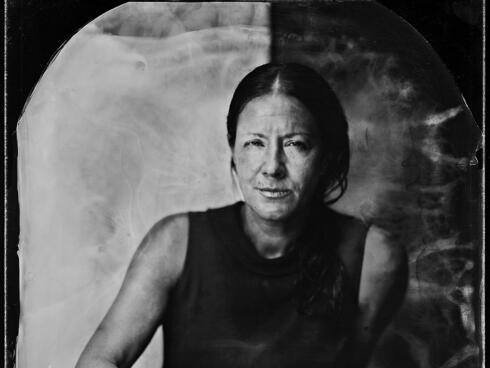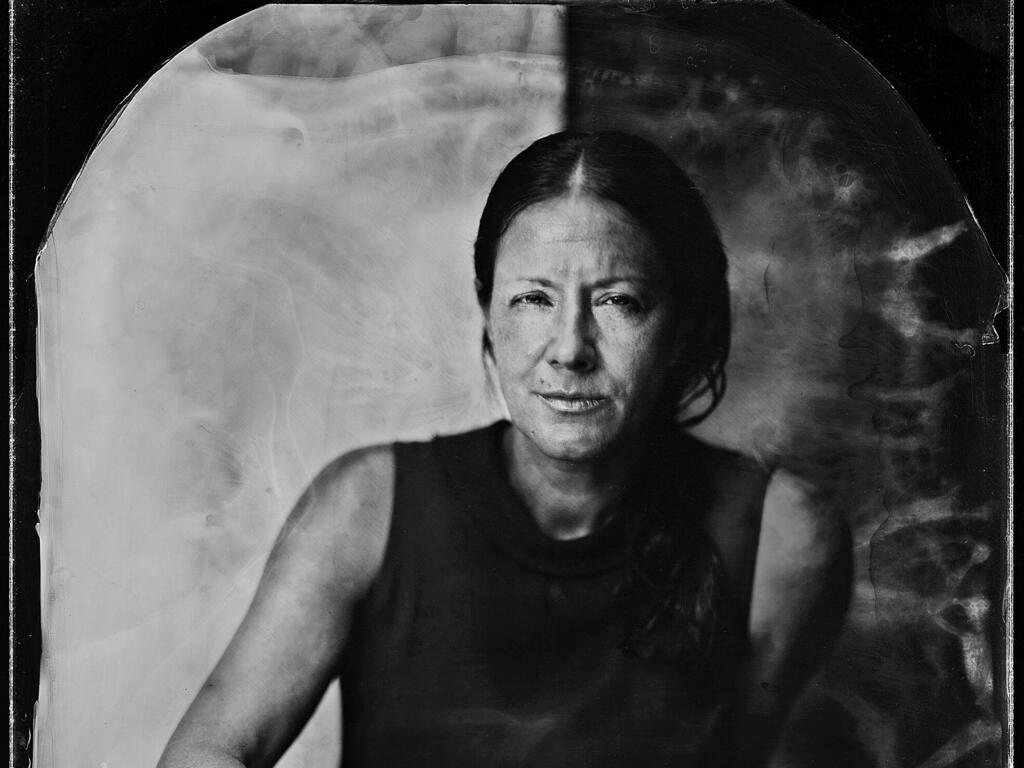
Long Exposure
"The protest is the startup that will rebuild Israel”
Michal Tsur-Shalev brings with her to the protest the legacy of her father, who was blind but also omnipotent, and of her mother, who did not shy away from public confrontations. This gives her the strength to grow high-tech companies and to continue to battle
Michal Tsur-Shalev, 50, serial entrepreneur, co-founder of Kaltura and Cyota
"My father, Haim Tsur, was blind, due to a genetic disease. But he worked as a journalist, producer, editor, and presenter at Kol Israel, managed a department there, and also played the violin and composed songs, among others to Arik Einstein (including a song that won the song festival, 'Leil Stav' ), to the comedy troupe Hagashash Hahiver and the children’s TV show 'Sami & Susu. The blindness was not his personality, father was omnipotent, he solved every problem. Some people say it needs to be solved, and some people solve it. Both he and my mother Naomi were entrepreneurs for me. My mother was a deputy mayor of Jerusalem and founded environmental organizations, and was involved in struggles in the field. So I grew up in a home where it is clear that anything is possible."
1 View gallery


Michal Tsur-Shalev
(Photo: Edward Kaprov. The photo was taken using the wet plate collodion technique, an early photographic process invented in the 19th century.)
Is this a feeling that accompanies you even today?
"Yes. I am a romantic and optimistic person, and I think it is possible to act, and it is possible to change. Even in this period, I am not motivated by anxiety but by hope, and it motivates me to fight for society here. This is also related to what I grew up with."
In what way?
"I grew up in a liberal home, with shades of religion. My mother came from a traditional Anglo-Saxon home, I studied for a few years in a religious school, and then I chose to go to a non-religious high school - and there was no problem with that. And it also worked in the opposite direction, when my brother chose religious education and lived for years as a religious person. We lived with pluralism - you can talk about everything and argue about different issues, from keeping kosher to politics. And you can change direction over the years. Being stuck and unable to change is a bad thing in my eyes."
Are you still optimistic?
"So many people took to the streets because they understood that the rules of the game were being changed. When reasonableness is eliminated, the government is basically saying, 'We don't want you to monitor us,' and that doesn't indicate good intentions."
But the rift is much deeper. Can it be overcome?
"All in all, a civil war has already started. But the question is how can it be stopped, or at least prevented from turning violent. Always when they said 'two states for two peoples' they always meant Israel and the Palestinians, and now... the question is whether it will be possible to adopt a set of common values. We must rediscover the common ground, otherwise the state has no existence."
And can you imagine such a situation, of separation into the State of Israel and the State of Judah?
"If Israel is the producer, the server, the developer, the builder - the state of Judah cannot exist without it."
What is the role of high-tech in this system?
"As far as I'm concerned, high-tech is the new Zionism. We are a small group of people who can provide products to hundreds of millions of people all over the world, this is not available in any other industry, it is the most’light unto the nations’ that there is. Look at the worldwide use of Waze, or our platform, of Kaltura. We move things with a global impact, and it takes years to build it. It takes a lot of time to be able to establish startups here, to make Israel a powerhouse in the field."
And now all this is at risk?
"If this happens, if the government is given unlimited power, there will be no business certainty, and we can say 'bye bye' to the name we have built for ourselves for years. Already now, investments in high-tech have almost stopped, and very few new companies are being formed, a large number of them are even registered outside of Israel. And it's not just because of the judicial reform'."
"Many core questions have been lurking here for years, and now they are emerging. For example, the integration of the ultra-Orthodox into society. There are more and more ultra-Orthodox who want to integrate, but their leadership does not allow it because of political interests. We must address this in cooperation with them, and create a different reality, with the consent of the government. The current government also hurts women - from their lack of representation in government offices to bills to strengthen the rabbinate. How dare you put something on the table that means a violation of rights?"
How do you conduct a high-tech protest without harming high-tech itself?
"I don't give interviews about this to foreign media, so as not to harm the industry. Others are also careful about this. The last thing we want is for investors to stop investing here. But they don't need us to understand - they see an unstable country, they see reports of the rating agencies on the consequences".
Kaltura has also been hit recently. Just two years ago you traded in New York at $12 per share, today it's only $2.
"Kaltura is not a startup that needs to raise money, it is strong and mature. The economy has cycles. There are industries that are more or less affected. We are in the video industry, which had a crazy boom during the pandemic, and it has declined. And we are still in a better position than other companies in the field. So the decline is an event of the entire capital market more than a matter of Kaltura."
Where is Israel's startup energy going now?
"To the protests. It is one big startup. People find what they can do according to their skills - logistics, strategy, who is good at writing, who is good at speaking, and so on. From this startup should be born the answer to the question of how to rebuild Israel.
"For most people, the only patriotic period they participated in was the military service, they checked that off their list, 'We served the country and therefore it is ours.' But now we are in the period of the new patriotism, there is a voluntary recruitment for the fight for the image of this country."
And in the midst of all this, how do you relax?
"Swimming, and in the past also running. I came to the sport because I am a competitive person, but there is something very meditative about swimming, a state where I can not think about anything. I swim in open water with my partner Eran, and I have other friends who swim, it's fun together. I also met a lot of my partners in high-tech through sports, and I love athletes, they are people with perseverance and activity. So first we bonded as a group, and only then did we decide what we wanted to do. First we formed a team, and only then came up with an idea. In the Sisyphean world of startups, this is important, because if the glue is strong enough, you can change direction together, until you find what you’re going to do. And the power of the team works even in difficult times, even when you are completely down."













